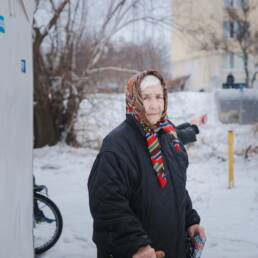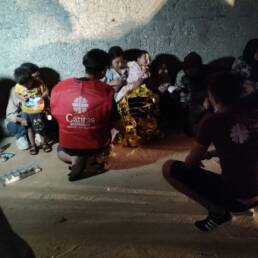Caritas Europa is alarmed and saddened by the humanitarian disaster that is unfolding after several fires destroyed nearly the entirety of the Moria refugee camp on the Greek island of Lesbos during the night of September 8th.
More than 12,000 residents had already been residing in the camp – at four times its capacity – in wretched conditions for months, sometimes extending even years while waiting for their asylum applications to be processed. Having fled from wars, extreme poverty and prosecution, the camp’s residents, including hundreds of children and vulnerable adults, are again bereft of shelter or security. The fire destroyed containers, tents, equipment and all facilities, including those of the Greek asylum service.
Just imagine the suffering these people have endured in their lives and to yet again be confronted with misery, uncertainty and lack of shelter. It is a miracle that there have been no casualties in the fires. Human compassion is more vital now that ever. At the same time, it is important to recognise that even before the fire the living conditions in the camp were untenable. The camp was overcrowded with hundreds of tents covering every empty space, with too few washing facilities, toilets, cooking options, play areas, etc. Clearly, alternative reception conditions based in solidarity and that ensure the human dignity of every resident must be sought across Europe now and in the future”
Maria Alverti, Director of Caritas Hellas
The situation remained chaotic as the former camp residents searched for safer ground. Considering the small size of the nearest town Mytilene, local police however blocked their passing with the aim of controlling the asylum applicants and stifling any fears about the possible propagation of COVID-19. Yet, COVID-19 restrictive measures – like elsewhere in Europe – were also applied in the refugee camp. Nevertheless, the Moria camp went into lockdown last week after one person tested positive with the virus in the area known as Mandala. From the 2,000 camp residents who were tested, only thirty-five positive COVID-19 cases emerged, indicating that the residents took great efforts under difficult hygienic conditions to reduce the outbreak.
Since the residents fled for safety when the fire struck, the Greek authorities are now trying to locate the residents who tested positive for the virus. Given the current conditions, Caritas is concerned that tensions may heighten in the days ahead, especially if the security and safety of the former camp residents and the local community are not ensured.

The Greek government moved police forces from Athens to Lesbos and declared a state of emergency on the island. Members of the government visited the camp on 9 September to assess the volatile situation. It is unclear how, and if, the migrants will be brought to safety. The European Commission announced the transfer of 400 unaccompanied children to the mainland, but no clear solution is in view for the thousands of others without shelter.
Caritas Hellas remains in close contact with organisations that are assessing the needs on Lesbos and is ready to offer support, in close coordination with the Ministry of Migration. The Ministry is urgently collecting tents from across the country to cover immediate needs and will coordinate the response with different actors once the needs assessment is finalised. The Caritas Hellas team on Lesbos is considering possibilities to distribute water to the refugees remaining on the street, in collaboration with the organisation “Movement on the Ground”. Sleeping bags are currently being procured as well. Caritas Hellas hopes to also provide non-food items as soon as the official needs assessment has been concluded.
Caritas Europa calls on EU stakeholders and Member States to quickly find a humane and dignified solution for the people left without shelter. Everyone, not only children, must be brought to safety, and the Greek government cannot be left alone in dealing with this challenging situation.
As EU leaders are finalising the upcoming pact on asylum and migration, such a predictable tragedy should serve as a wakeup call, warning leaders to avoid duplicating this model, which was doomed to fail from the start with the overcrowding. A fair and permanent relocation mechanism ensuring solidarity and responsibility sharing among EU Member States, anchored in human rights and human dignity must be urgently put into place”
Maria Nyman, Secretary General of Caritas Europa.
Already four years ago, when Pope Francis visited the Moria camp, he said:
A broader international consensus and an assistance programme are urgently needed to uphold the rule of law, to defend fundamental human rights in this unsustainable situation, to protect minorities, to combat human trafficking and smuggling, to eliminate unsafe routes, such as those through the Aegean and the entire Mediterranean, and to develop safe resettlement procedures.”
From the joint declaration of His Holiness Bartholomew, Ecumenical Patriarch of Constantinople, of His Beatitude Ieronymos, Archbishop of Athens and all Greece and of His Holiness Pope Francis in Mòria Refugee Camp, Lesvos. Saturday, 16 April 2016.
More information
Leïla Bodeux
Senior Policy and Advocacy Officer
Tel: +32 (0)2 235 26 55
Mob: +32 (0)478 585 409
lbodeux@caritas.eu




